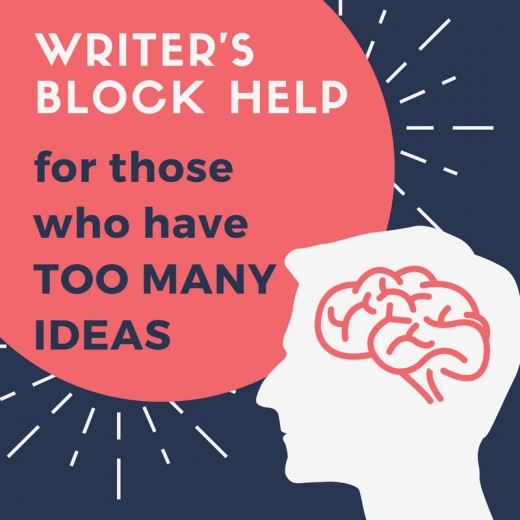Writer's Block Help for Those Who Have Too Many Ideas

In his post, Finding Story Ideas from Real Life, writer Bill Holland offered a wealth of inspiration sources for writers. In the comments section, a number of the writers noted that they had too many ideas and that inspiration was not a problem. This is the opposite problem to writer's block. Call it writer's burst!
While it's always good to have more ideas than needed, having too many can lead to the following writing problems:
- Analyze or Paralyze? Is it a good idea? Feeling that many of the article ideas may not have merit, writers can overanalyze the viability of any one of them... or even all of them! The result is the same as with writer's block: No writing gets done.
- Half Baked and Half Done. Another problem is pursuing all ideas, often all at the same time. This results in dozens (hundreds?) of half developed ideas and half done articles. The other result is that a writer can feel overwhelmed by the sheer number of articles before him, sometimes giving up on all of them. Again, same result as writer's block: No writing gets done.
Questions to Help Evaluate Writing Ideas
So how can a writer overcome writer's block, become a good editor and pursue writing projects of greatest value? These questions can help:
- Does this idea align with the subject(s) for which I have greatest expertise and recognition? Sure, it's good to stretch and venture into new territory. But how far off the normal path is this? If it will cause confusion for followers or new readers, ditch the idea. Alternatively, find a way to connect a random idea with typical topics. This can make for some very interesting and creative work.
- Does this idea help me build my writing business? If the goal is to become a paid writer, articles on scattered subjects don't present a cohesive body of work that clients want to see.
- Can several of these ideas blend together into one? Sometimes writers' brain bursts are embryonic ideas trying to connect and grow. Look over the list of random ideas and see how they could connect.
- Is there a market for this idea? The list of possible article, report and book topics is almost infinite. But if the goal of writing is to generate Internet traffic or sales, the idea needs a significant amount of monthly searches in target markets. Using the Google AdWords Keyword Planner Tool is invaluable in doing this type of filtering. A case can be made for "long-tail" keywords with low occurrence if this minimal market ties in with larger writing objectives.
These questions can also be used when evaluating whether to pursue guest blogging opportunities. Unfortunately, many guest posts are unpaid. If the blog, website or publication does not align with a writer's need to build a relevant portfolio or his business, pursuing too many guest posts can rob a writer of time and profits.
Tools for Tracking and Evaluating Writing Ideas
What can writers use to track and evaluate ideas as these bursts of inspiration hit? Some are high tech, others old school. The actual tools used don't matter. What matters is that they are actually used.
- Notebooks and Pens. Truly old school! Yet there are writers that find them more conducive to the creative process than gadgets and computers. Separate notebooks can also be used for different topics. Best feature is that they don't require batteries or power and can be used in a wide variety of inspirational settings. Plus, notebooks can often be recycled! Keeping one next to one's bed at night is perfect for those middle of the night brain bursts.
- Voice Recorders/Software. Voice recorders make it easy to capture ideas even while driving, but they do require transcription. Luckily there are services online which can transcribe these recordings for a fee. But even better is to use software or a mobile app, such as Dragon Dictation, which types while you talk. Then it's merely a task of organizing the transcribed files for access and evaluation later.
- Spreadsheets. Using a program such as Microsoft Excel, ideas can be entered into a searchable spreadsheet. Ideas can be alphabetized, tagged and organized for easy reference when the writer's burst turns into writer's block and an idea needs to be found.
- Organizational Software/Apps. Programs such as Evernote can help organize those overflowing streams of ideas into categories for easy reference later.
This article is accurate and true to the best of the author’s knowledge. Content is for informational or entertainment purposes only and does not substitute for personal counsel or professional advice in business, financial, legal, or technical matters.
© 2013 Heidi Thorne







